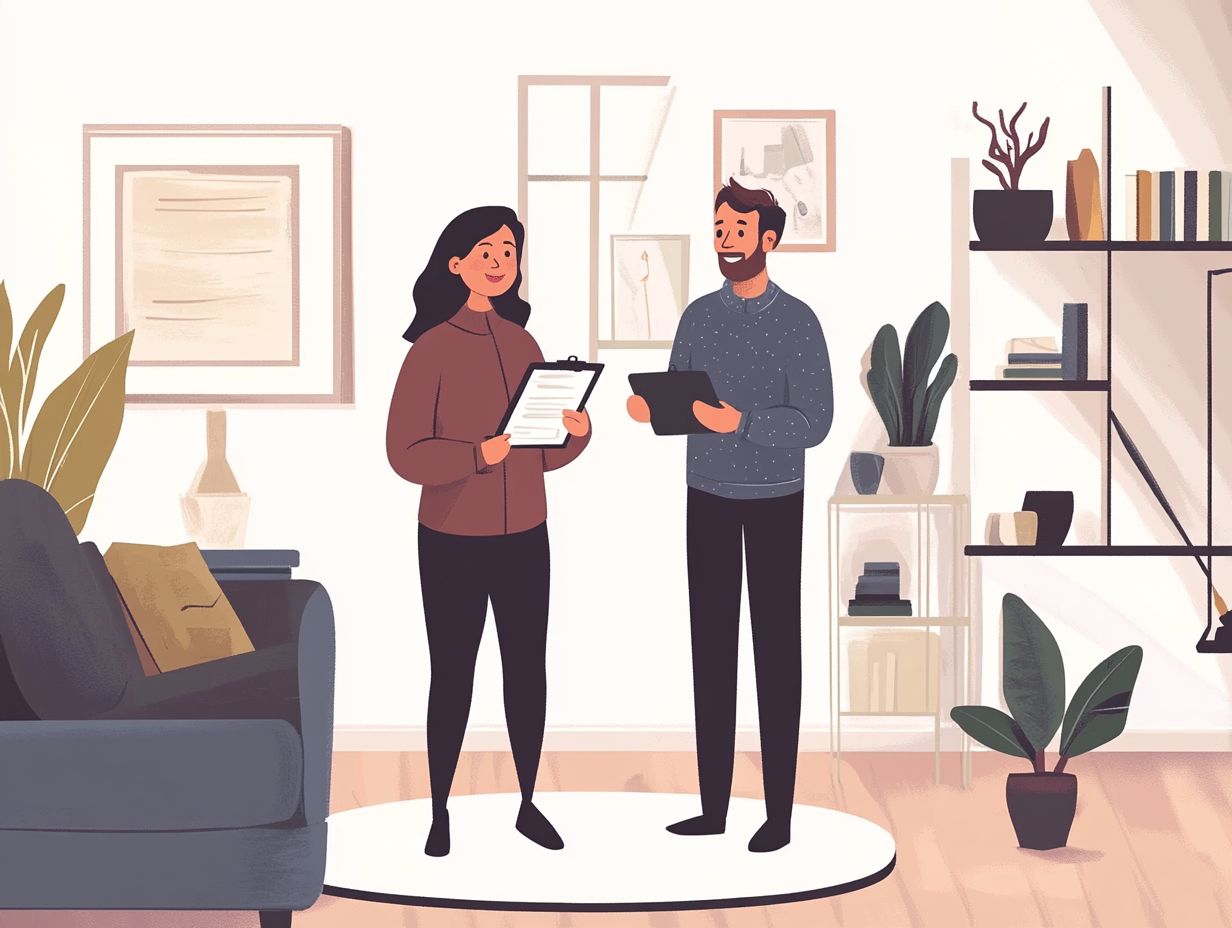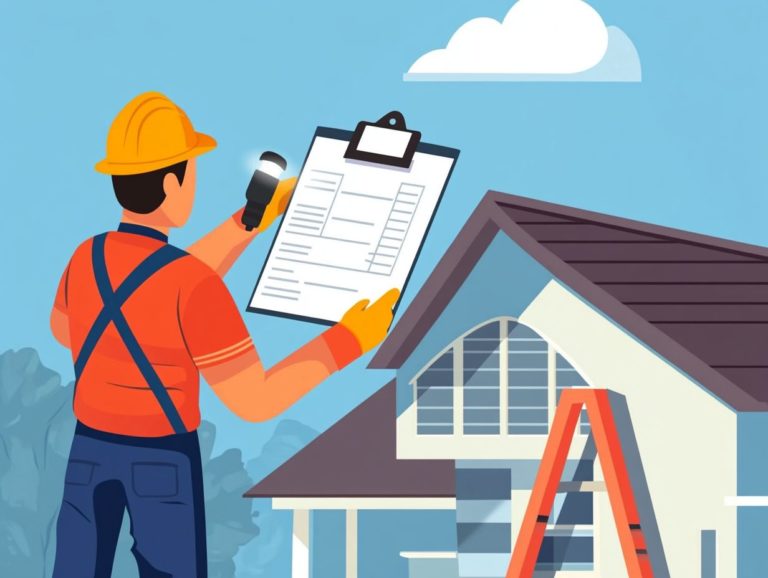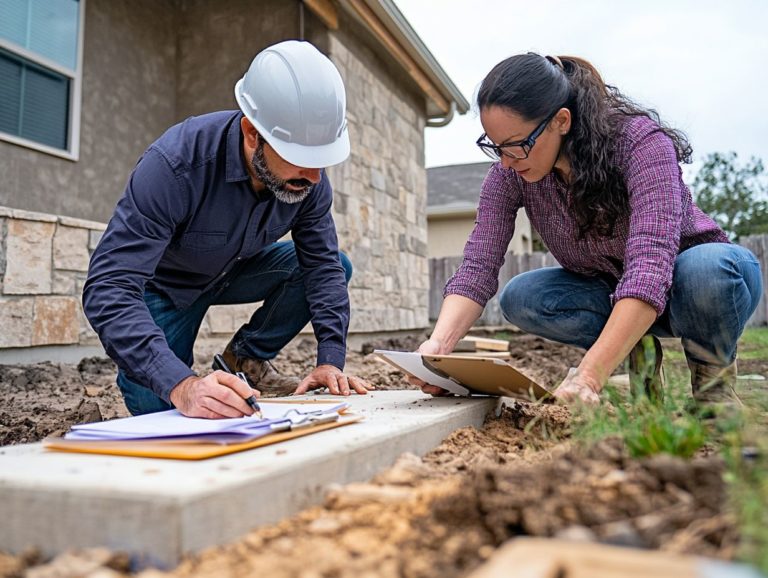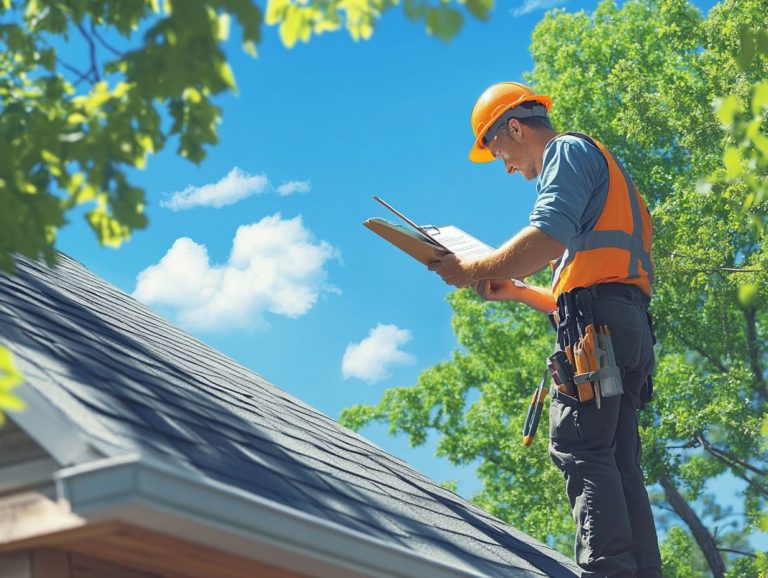How to Choose an Inspector for Your Home
Buying a home stands as one of life s most significant investments. Ensuring it s the right choice calls for thoughtful consideration on your part.
A home inspector is an invaluable ally in this journey, providing insights that can help you avoid unexpected repairs and costly financial missteps.
This guide walks you through the essential elements of hiring a home inspector, including their vital role, the qualities that distinguish the best from the rest, key questions to pose, and strategies for effectively comparing your options.
By understanding the costs involved and the intricacies of the contract, you ll equip yourself to make a well-informed decision. Dive in to discover how you can select the right inspector for your future home.
Contents
Key Takeaways:

- Choose a certified and experienced home inspector who pays attention to detail and has strong communication skills.
- Ask about their experience, training, and types of inspections offered.
- Request a sample inspection report before hiring.
- Research and compare home inspectors through online reviews, referrals, and interviews.
- Understand the costs and what’s included in the inspection contract before signing.
Understanding the Role of a Home Inspector
A home inspector is an important part of the home buying journey. They offer invaluable insights into a property’s condition and reveal potential hidden issues that might not be apparent at first glance.
As a qualified professional, a home inspector performs an in-depth physical inspection of the property. They evaluate various systems and components, including plumbing, electrical, roofing, and structural concerns.
By familiarizing yourself with the certification requirements and leveraging advanced technology like thermal imaging, a qualified home inspector can present you with a detailed report that outlines necessary repairs. This empowers your negotiation strategies as a home buyer.
What Does a Home Inspector Do?
A home inspector plays a crucial role in assessing a property’s overall condition. They conduct meticulous inspections that bring hidden issues and structural concerns to light.
This process involves a detailed examination of major systems, including the roof, plumbing, electrical, and HVAC, ensuring everything operates correctly and safely. The inspector carefully looks for signs of damage, wear, or inadequate maintenance details that might easily escape the property owner’s notice.
They might suggest tests for radon or pests to identify any potential risks that could impact the health and safety of the inhabitants.
By conducting these thorough assessments, inspectors offer invaluable insights, empowering you to make informed decisions as a buyer.
Qualities to Look for in a Home Inspector
When hiring a home inspector, it’s essential to consider several key qualities to help you choose the right inspector for your home based on your needs.
Focus on certifications, experience, attention to detail, and effective communication skills. A qualified home inspector should hold relevant certifications from reputable organizations, such as the American Society of Home Inspectors or the International Association of Certified Home Inspectors.
Additionally, strong referrals and a dedication to providing thorough, clear communication can greatly enhance your home buying experience.
Certifications and Experience
When evaluating a home inspector, consider their certifications and experience. These factors assure you of the inspector’s knowledge and proficiency in conducting thorough home inspections, making it easier to understand how to choose the best home inspector near you.
Valid certifications from reputable associations, like the International Association of Certified Home Inspectors (InterNACHI) or the American Society of Home Inspectors (ASHI), signify that the inspector has met rigorous standards and completed necessary training.
But it doesn t stop there hands-on experience in the field is equally crucial. It enables inspectors to recognize potential hidden issues within a property’s structure and systems, which might easily escape an untrained eye.
This powerful combination of formal education and real-world expertise allows inspectors to compile comprehensive inspection reports, providing you with invaluable insights into your prospective home. Ultimately, this information empowers you to make informed purchasing decisions.
Let s find the perfect inspector for your dream home!
Attention to Detail
Attention to detail is very important for you as a home inspector, significantly influencing the accuracy of your inspection report and your ability to spot hidden issues and structural concerns.
By embracing a meticulous approach, you can look at both big and small parts of a home. Those seemingly minor defects, if left unchecked, may evolve into significant problems down the line.
This thorough examination deepens your understanding of a home s condition, allowing you to offer invaluable insights that can protect homeowners from future financial burdens.
Diligence helps maintain property value by identifying issues early. By spotting signs of wear or damage, you ensure that necessary repairs are made in a timely manner, safeguarding the integrity and appeal of the property.
Communication Skills

Strong communication skills are crucial for home inspectors, ensuring that your clients fully comprehend the findings of the inspection report and any recommendations that come with it. Clarity in how you convey information can significantly shape a homeowner’s decision-making process.
Break down technical terms into simple words, allowing clients to understand the implications of any issues that arise during the inspection.
When potential consumers are searching for an inspector, they should prioritize reviews that emphasize your ability to communicate effectively. Positive feedback regarding your prompt responses, thorough explanations, and approachable demeanor not only reassures clients but also boosts your credibility in the marketplace.
Ultimately, the effectiveness of your communication fosters trust and gives the power to clients to make informed choices about their property investments.
Questions to Ask When Hiring a Home Inspector
When hiring a home inspector, asking the right questions is vital to ensure you find a qualified professional. For guidance, check out this resource on how to choose the best home inspector tailored to your specific needs.
It’s essential to delve into the inspector’s experience, training, and background in the field. Inquire about the types of inspections they specialize in such as checking for a colorless gas that can cause health problems, or assessing for harmful mold growth.
Don t hesitate to request a sample inspection report; this will give you valuable insight into the inspector s thoroughness and attention to detail, giving you the confidence to make a well-informed decision.
Take the step now ask the right questions and secure a trustworthy inspector today!
Experience and Training
When evaluating a home inspector, experience and training are very important considerations, as these elements directly impact their ability to conduct thorough inspections.
Formal training provides inspectors with crucial knowledge of building codes, safety standards, and structural integrity, forming the foundation of their expertise. However, it s the hands-on experience that truly hones their skills, enabling them to spot subtle warning signs and uncover hidden issues that might easily slip under the radar.
This combination of training and real work not only enhances their analytical capabilities but also boosts their confidence during inspections. By merging theoretical principles with real-world applications, inspectors become skilled at assessing various types of properties, ensuring that prospective homeowners receive comprehensive evaluations that significantly inform their purchasing decisions.
Types of Inspections Offered
Understanding the types of inspections offered by a home inspector is vital for you as a buyer, giving you the ability to choose the right inspector tailored to your specific needs and concerns.
Inspections can range from comprehensive assessments that provide a sweeping overview of a property’s condition to specialized tests that focus on particular issues.
A thorough general home inspection evaluates key components like the roof, plumbing, electrical systems, and structural integrity, giving you peace of mind about your investment.
Radon tests are crucial for identifying potential health risks posed by elevated levels of the gas. Meanwhile, mold assessments can uncover hidden moisture problems that might lead to serious health concerns, while pest infestation evaluations help reveal issues that could threaten a home’s safety.
By grasping these various options, you can make informed decisions and ensure you are fully aware of any potential challenges awaiting you.
Sample Inspection Report
Requesting a sample inspection report from a home inspector can offer you invaluable insights into the thoroughness and clarity of their evaluations essential components for making informed decisions. This document acts as a vital tool, allowing you to gauge not only the inspector’s attention to detail but also the overall comprehensiveness of their work.
When reviewing these reports, pay close attention to key areas, including:
- Structural integrity
- Electrical systems
- Plumbing
- Any potential hazards
A well-organized report should be easy to digest, clearly highlighting critical issues while providing recommendations for repairs or further evaluations. By examining such samples, you can more accurately assess the inspector’s expertise and methodology, ensuring you have a well-rounded understanding of the property in question.
Researching and Comparing Home Inspectors
Researching and comparing home inspectors is essential for you to hire a qualified professional capable of accurately assessing the property you plan to purchase. For guidance, check out how to choose the right inspector for your property, as this decision can greatly affect your investment.
As a potential homebuyer, you should delve into various resources, such as online reviews from platforms like Angi or the Better Business Bureau, to evaluate the reputation of different home inspectors. Seeking referrals from real estate agents or previous clients offers valuable firsthand insights into an inspector’s reliability and effectiveness.
Online Reviews and Referrals

Online reviews and referrals serve as invaluable resources for you as a prospective home buyer, helping you compare home inspectors through insights shared by previous clients about their experiences. These reviews do more than just highlight the quality of service; they reveal the subtleties of the inspector’s professional demeanor, communication skills, and thoroughness in assessments.
By utilizing platforms like Angi and the Better Business Bureau, you can gain deeper insights into the credibility of these experts, allowing you to differentiate those who consistently receive positive feedback from those with questionable reputations.
In a market where trust is essential, harnessing these consumer insights can be key to ensuring a successful home purchase rather than facing unexpected complications later on.
Interviewing Multiple Inspectors
Interviewing multiple home inspectors is a strategic move that gives you the power to evaluate qualifications, experience, and communication styles before making a hiring decision. This approach not only helps set clear expectations for the inspection but also gives you a chance to learn how to choose the best home inspector for your needs and assess how each inspector conveys complex technical details.
A clear exchange fosters trust and ensures that all your concerns are thoroughly addressed. By comparing inspection reports and quotes from different professionals, you gain a comprehensive understanding of what to expect, enabling you to spot any potential red flags.
Ultimately, this careful prep gives you the confidence to make smart decisions as you navigate this significant investment.
Costs and Contracts for Home Inspections
Understanding the costs and contracts linked to home inspections is vital for you as a home buyer. This knowledge gives you the power to budget effectively and makes sure you get a good deal for the services rendered.
Home inspectors usually offer a detailed quote that breaks down the costs associated with the inspection, including any extra tests or specialized services like radon or mold inspections that may be necessary.
Familiarizing yourself with the pricing structure and contract terms is critical to sidestep unexpected fees and to ensure that you have comprehensive coverage throughout the inspection process. Understanding costs now helps avoid surprises later!
Understanding Pricing and What’s Included
Understanding the pricing for home inspections is essential for you as a buyer, as it directly influences your overall investment and ensures you receive a thorough evaluation of the property.
A transparent pricing structure can illuminate the specific services included in the inspection, such as the assessment of crucial components like the roof, plumbing, and electrical systems.
You should be aware that additional tests, such as radon or pest inspections, can incur extra costs that may vary by region and the inspector s expertise. Therefore, it s vital for you to request a detailed quote upfront.
This not only itemizes the services provided but also gives you the power to budget effectively, helping you avoid any unwelcome surprises during an important transaction.
Reviewing and Signing the Inspection Contract
Reviewing and signing the inspection contract is an important step in your home buying journey, ensuring that you and the home inspector are on the same page regarding expectations and responsibilities.
Taking the time to thoroughly read through the entire agreement is essential, as it outlines crucial details that could significantly impact your transaction. You should pay close attention to the terms and conditions that define the scope of work and any limitations of the inspection.
Make sure the inspector has errors and omissions insurance, a type of insurance that protects you if something is missed during the inspection. This diligence protects your investment and gives you peace of mind during the home inspection.
Frequently Asked Questions
What should I look for in a home inspector?

When choosing an inspector for your home, it is important to look for someone who is licensed and certified. You should also consider their experience and knowledge in the construction and/or home inspection industry. Additionally, it is beneficial to find an inspector who offers a detailed report and is willing to answer any questions you may have, as outlined in this guide on how to choose an inspector for your home.
How do I find a reputable inspector?
The best way to find a reputable inspector is to ask for referrals from friends, family, or your real estate agent. You can also search online for reviews and ratings from previous clients. For comprehensive guidance, check out how to choose the right home inspector for you. It is important to do your research and choose an inspector with a good reputation in the industry.
What is the difference between a home inspector and a contractor?
A home inspector is trained and certified to evaluate the overall condition of a home, while a contractor is typically hired to complete repairs or renovations. While some home inspectors may also have a background in construction, their role is primarily to provide an unbiased evaluation of the home’s condition.
Should I attend the inspection?
It is highly recommended that you attend the inspection or at least the final walkthrough with the inspector. This will allow you to ask any questions and get a better understanding of the inspection report. It also gives you the opportunity to see any potential issues firsthand.
How much does a home inspection cost?
The cost of a home inspection can vary depending on the size and location of the home, as well as the inspector’s experience and services offered. On average, a home inspection can cost between $300 and $500. It is important to keep in mind that a thorough inspection can save you money in the long run by identifying potential problems before you purchase the home.
What if the inspector finds issues with the home?
If the inspector does find issues with the home, it is important to discuss them with your real estate agent and potentially negotiate repairs with the seller. The inspector’s report may also provide information on the severity and urgency of the issues, which can help guide your decision on whether or not to proceed with the purchase of the home.
Don’t hesitate to take the next step toward your home inspection by contacting a trusted inspector!






